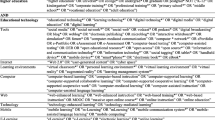Abstract
Initial findings from the evaluation of the GLOBE Program are used to shed light on three issues concerning student-scientist partnerships: (1) Can students and scientists both derive genuine benefits from such partnerships? (2) What does technology add to efforts to bring authentic science into schools? (3) What is the relationship between student-scientist partnership programs and education reform efforts? Tensions between the goals of science and those of education are discussed and strategies for balancing conflicting requirements described. Both pragmatic and motivational benefits of technology use are cited. Although the evaluation of GLOBE's first year did not find evidence that student-scientist partnerships are sparking a transformation in teaching approaches, such programs provide a supportive context within which teachers seeking to align their practice with education reform principles may do so.
Similar content being viewed by others
REFERENCES
American Association for the Advancement of Science. (1993). Benchmarks for Science Literacy, Oxford University Press, New York.
Collins, A., Brown, J. S., and Newman, S. E. (1989). Cognitive apprenticeship: Teaching the craft of reading, writing, and mathematics. In Resnick, L. B. (Ed.), Knowing, Learning, and Instruction: Essays in Honor of Robert Glaser, Erlbaum, Hillsdale, New Jersey, pp. 453–494.
Gordin, D., Gomez, L., Pea, R. D., and Fishman, B. (December 1996). Using the World Wide Web to build learning communities in K-12 Journal of Computer-Mediated Communications 2(13).
Gore, A. (1992). Earth in the Balance: Ecology and the Human Spirit, Houghton Mifflin, New York.
Linn, M. C. (in press). Designing computer learning environments for engineering and computer science: The scaffolded knowledge integration environment. Journal of Science Education and Technology.
Means, B., Middleton, T., Lewis, A., Quellmalz, E., and Valdes, K. (1996). GLOBE Year 1 Evaluation: Findings, SRI International, Menlo Park, California.
National Research Council. (1996). National Science Education Standards, National Academy Press, Washington, DC.
Robardy, Sr., C., Allard, D., and Brown, D. (1994). An assessment of the effectiveness of the Full Option Science System training for third through sixth grade teachers. Journal of Elementary Science Education, 6, 1.
Rock, B. N., Blackwell, T. R., Miller, D., and Hardison, A. (1997). The GLOBE Program—A model for international environmental education. In Cohen, K. (Ed.), Internet Links for Science Education, Plenum Publishing, New York, pp. 17–30.
Rock, B. N., and Lawless, J. G. (1997). The GLOBE Program: A source of datasets for use in global change studies. IGBP Newsletter 29: 15–17.
TERC. (1993–94). Global Lab Annual Report. Cambridge, Massachusetts, Author.
Rights and permissions
About this article
Cite this article
Means, B. Melding Authentic Science, Technology, and Inquiry-Based Teaching: Experiences of the GLOBE Program. Journal of Science Education and Technology 7, 97–105 (1998). https://doi.org/10.1023/A:1022592317752
Issue Date:
DOI: https://doi.org/10.1023/A:1022592317752




